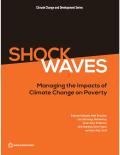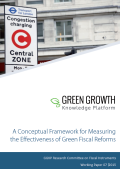
Climate change and climate policies will affect poverty reduction efforts through direct and immediate impacts on the poor and by affecting factors that condition poverty reduction, such as economic growth. This report explores the relation between climate change, climate policies, and poverty outcomes by examining three questions: the (static) impact on poor people's livelihood and well-being; the impact on the risk for non-poor individuals to fall into poverty; and the impact on the ability of poor people to escape poverty. The report explores various channels through which climate change and policies will affect poverty: economic impacts through incomes and prices; natural disasters and their effects on assets and livelihoods; and health impacts. It also investigates policy options to ensure adaptation and mitigation policies -- such as adaptive and well-targeted social protection, public investments, and financial inclusion policies -- contribute to poverty reduction and protect poor people against climate change impacts.
A green bank is a public or quasi-public institution that uses limited public capital to leverage greater private investment in clean energy. Green banks are designed to animate private capital markets and “crowd-in” the private investment needed to rapidly deploy commercial, proven clean energy technologies. As a public or quasi-public institution, a green bank is either directly part of government or an instrument of government. As such, a green bank can be crafted and designed to suit the market needs and policy objectives of the nation or state it is meant to serve. A green bank can be capitalized with any number of public sources. With their public dollars, green banks provide financing for projects in combination with private capital. Among the financing techniques commonly used are credit enhancement, co-investment, and warehousing/securitization. Green banks can use the described financing techniques through a number of structures that the clean energy financing industry has developed as new delivery mechanisms, including Property Assessed Clean Energy (PACE) financing and on-bill financing/repayment.
Nowadays, sustainable development has been introduced and integrated into production and operation management field through the concept of the green supply chain. Green regulations and principles have gained the interest of managers and practitioners in selecting innovative practices for suppliers and organisations. Accordingly, the present study aims to evaluate the relationship between a green supplier, green innovation, environmental performance, and competitive advantage in the cement industry, which is an important industry for Iran. This study is descriptive in nature and conducted based on correlation and structural equation modelling. Managers and experts of cement companies in Fars Province are selected as samples for the study. A questionnaire and Smart-PLS software were used as research tools. The results of data analysis show that there is a positive and significant relationship between a green supplier, green innovations and environmental performance of an organisation, while there is a negative yet significant relationship between a green supplier, green innovations and environmental performance of an organisation.


